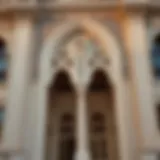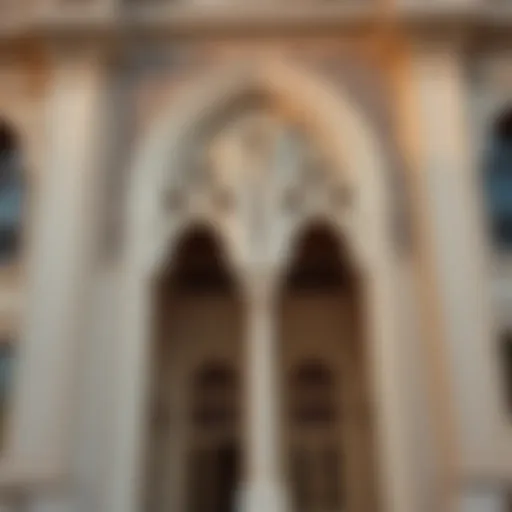Exploring the Essence of Emirati Wealth: الفوالة الاماراتية
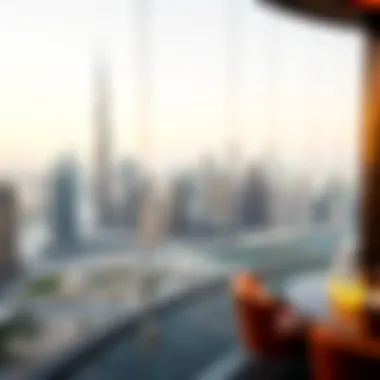

Intro
The concept of الفوالة الاماراتية is intricately woven into the fabric of Emirati identity, reflecting not just wealth but also a deep-seated cultural lineage. This multifaceted term encompasses the lavish lifestyles, social practices, and economic strategies that have come to define the affluent realm of the United Arab Emirates, and particularly Dubai. In a world where material success is often assessed by the size of a villa or the opulence of a car, understanding الفوالة becomes essential for anyone looking to navigate this shifting terrain of prosperity.
This article intends to offer an insightful exploration into the heart of Emirati wealth, unraveling layers of meaning that extend beyond mere financial status. Indeed, الفوالة is a display of tradition, family ties, and community relationships that stand firm amidst changing modern values. An integral part of this exploration is the pivotal role that real estate plays within this landscape, guiding both investors and homeowners alike.
By focusing on current market trends, investment strategies, and cultural dimensions, we'll endeavor to shed light on how الفوالة secures its place in Dubai's dynamic property market. Whether you're a seasoned investor, a property manager, or a first-time homebuyer, appreciating these elements will empower you in making informed choices.
Historical roots, contemporary expressions, and future predictions will be dissected to provide a panoramic view of the real estate scene within the UAE. Through this, the nuances of الفوالة will unveil itself, establishing a connection between traditional practices and modern living standards.
As we embark on this journey, let’s first delve into the market insights, where we will closely examine the present trends in Dubai real estate and anticipate future predictions.
Cultural Significance of الفوالة الاماراتية
The concept of الفوالة الاماراتية waves through the fabric of Emirati life, embodying values and practices that date back generations. This phenomenon is not merely about the material wealth associated with it; there’s a tapestry of cultural identity and social structure intricately woven into its very essence. To grasp its full significance, one must consider several aspects that shape this cultural cornerstone, from historical roots to religious influences.
Historical Context
To understand الفوالة, one can't simply skim over its historical context. This concept evolved amidst the shifting sands of the UAE’s landscape, from pre-oil trading times to the wealth brought about by natural resources. In the early days, Arabic tribes practiced الفوالة as a means to establish trade and maintain relationships, using the limited resources they had efficiently. It was common to see gatherings where the sharing of goods and hospitality acted as a glue binding these communities together.
Fast forward to the oil boom of the late 20th century, and الفوالة transformed alongside the nation’s economy. Now, it manifests in opulent invitations to grand events, showcasing wealth not just for personal pride but as a reaffirmation of community ties and national identity. By sharing great feasts and presenting gifts, Emiratis reinforce solidarity and mutual respect.
One cannot ignore, however, that this evolution also brought forth challenges such as the overshadowing of traditional values by consumerism. Such dynamics necessitate a thoughtful examination of how الفوالة continues to adapt, balancing between heritage and modern influences.
Religious Influences
Religion, particularly Islam, plays a pivotal role in emphasizing the values linked to الفوالة. It guides Emiratis in their philanthropic endeavors and social conduct. The concept of sharing—rooted in Islamic teachings—emanates from the belief that charity and generosity are vital components of one's faith. This aligns perfectly with الفوالة, as hosting gatherings and sharing food are seen as both acts of hospitality and piety.
Moreover, social events rooted in الفوالة often coincide with Islamic festivities like Eid al-Fitr and Eid al-Adha, where community feasts flourish. This convergence further cements الفوالة's place in the cultural and religious landscape of the UAE, reminding individuals of the importance of togetherness in both joyous and challenging times.
"فوالة is not just a practice; it's a way of life that reminds us of where we came from and the values we hold dear as a community."
In essence, الفوالة embodies a profound statement of identity and ethos among Emiratis. This cultural significance persists and evolves, embodying a blend of history and faith that resonates with both the past and the present. For investors and property stakeholders in the region, recognizing this intricate relationship between wealth, tradition, and social dynamics is paramount. It opens pathways to deeper understanding and engagement with the Emirati culture, essential for fostering long-term connections in a rapidly changing environment.
For further exploration, check out these resources:
- Britannica - Gulf States
- Wikipedia - Culture of the United Arab Emirates
- Reddit - Emirati Lifestyle Discussion
Engaging with these various facets of الفوالة can illuminate the rich tapestry of Emirati culture for anyone looking to invest or learn more about this fascinating region.
Economic Impact on the UAE
The economic ramifications of الفوالة الاماراتية are intricate and cannot be overstated. This phenomenon isn't just about wealth; it's also about a system that shapes the economic landscape of the UAE, particularly in burgeoning hubs like Dubai. The concept of الفوالة serves both as an indicator of wealth distribution and a catalyst for wealth generation, driving investment, tourism, and more. It presents a multifaceted impact that affects not only those within the Emirati community but also influences outsiders considering their foothold in these vibrant markets.
Wealth Distribution and Inequality
Wealth distribution in the UAE showcases a paradox. On the surface, the country boasts almost unparalleled wealth per capita, yet there exists a tapestry of inequality. With a considerable portion of wealth concentrated among fewer families and individuals, the realities of الفوالة reveal disparities.
- Families with significant oil revenues often showcase their riches through extravagant spending, leading to a boom in luxury sectors.
- Meanwhile, a considerable number of expatriates contribute prominently to the economy but find themselves on the outer fringes of this wealth spectrum.
The dialogue around wealth distribution often brings into focus the need for a more inclusive economy. This can be particularly relevant for investors and homebuyers who are looking at underlying trends which might indicate where future opportunities lie.
Role of Oil and Natural Resources
In the context of the UAE, oil isn't just a natural resource; it's a lifeline that fuels the whole economy. The emergence of الفوالة is deeply intertwined with the oil boom, which has catalyzed unprecedented development and foreign investment. The revenues generated from oil production have financed lavish projects, luxury developments, and towering skyscrapers that epitomize wealth.
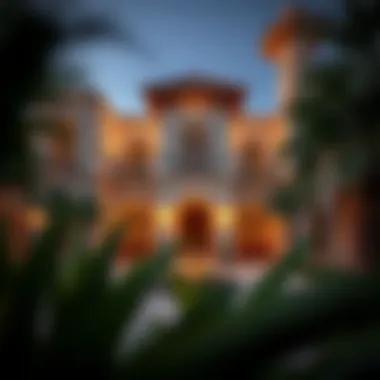

"Oil wealth has made possible the rapid transformation of Dubai into a global financial hub, yet it is essential to recognize the dynamics of resource allocation that sustain this progress."
Natural resources also extend beyond oil; with investments pouring into renewable energies, the UAE is positioning itself as a leader in diversifying its economic avenues. Understanding the fluctuations in the oil market can help investors forecast patterns that might affect property values and market trends, making it a critical element of the larger economic picture.
- The introduction of measures like VAT and increased focus on tourism signals efforts to stabilize the economy.
- As the nation leans towards sustainability, it’s essential to view how الفوالة is adapting in this new economic landscape driven by resource reallocation.
In summary, the economic impact of الفوالة on the UAE is substantial. While the riches associated with it present a facade of endless opportunity, a closer examination reveals layers of nuance concerning wealth distribution and the pivotal role that oil and other natural resources play. This exploration is invaluable for investors and property stakeholders aiming to navigate this complex economic terrain.
Emirati Lifestyle and الفوالة
The Emirati lifestyle is often painted in broad strokes of wealth, culture, and tradition, but the intricate patterns woven into this fabric can sometimes go unnoticed. الفوالة offers a glimpse into the heart of Emirati wealth, revealing not just an abundance of material possessions, but a deep-rooted social architecture shaped through history, religious beliefs, and the inherent values of the people. The significance of الفوالة transcends mere luxury; it symbolizes a unique identity that amalgamates the past with the present.
Luxury and Opulence
In the realm of الفوالة, the elements of luxury and opulence go beyond the mere appearance of wealth. It’s about creating an immersive experience that reflects status and heritage. For example, lavish celebrations, such as weddings or major holidays, are often characterized by extravagant setups that incorporate gold accents, sumptuous textiles, and an abundance of food. Each of these elements tells a story, a visual representation of prosperity that is deeply ingrained in the Emirati ethos.
Moreover, high-end shopping is not just about purchasing goods; it transforms into a vital social activity within the UAE. Shopping malls such as The Dubai Mall and Mall of the Emirates serve as landmarks not only for their retail offerings but also as spaces for social interaction among Emiratis. Brands like Chanel and Gucci don’t just sell clothes; they contribute to a culture of exclusivity, where owning certain items elevates one’s social standing.
The luxury car market also reflects this lifestyle. Many Emiratis lean towards supercars, showcasing their wealth through vehicles from brands like Ferrari and Lamborghini. Owning these cars is often seen as a status symbol, while driving them on the streets of Dubai or Abu Dhabi becomes a form of personal expression. This embrace of luxury fosters a community where wealth is not just accumulated but shared through collective experiences of sophistication and refinement.
Traditions and Customs
While الفوالة is intertwined with wealth, its roots are tightly anchored in Emirati traditions and customs. These traditions shape the community’s values and provide a framework within which they navigate the complexities of modernity. Emirati gatherings often showcase traditional dress, with men in their kanduras and women in beautifully crafted abaya, which signifies both pride in culture and the fusion with contemporary fashion trends.
Festivals such as Eid Al Fitr and Eid Al Adha bring families and communities together, illustrating the social dynamics that are integral to Emirati life. During these occasions, it is customary to exchange gifts and lavish hospitality. Creating an atmosphere of generosity strengthens community bonds and underlines the importance of relationships which often outweighs the material aspects of wealth.
The values of respect and honor are sacrosanct, with customs rooted in Islamic teachings guiding interactions among individuals. Even within the realm of economics, الفوالة demands a balance; successful Emiratis often leverage their wealth in ways that uplift their communities, fostering an environment of mutual growth. This complexity exemplifies how الفوالة serves to enhance not just individual wealth but also collective prosperity.
"In navigating the modern landscapes of wealth, the true essence of Emirati identity often surfaces through traditions that remind us of where we come from."
In summary, the Emirati lifestyle, coupled with الفوالة, is a narrative rich with layers of meaning. It's a story that showcases how luxury is not merely an end in itself but rather a means to express identity, heritage, and community ties within the broader spectrum of UAE societal dynamics.
Real Estate Trends in Dubai
The real estate market in Dubai has garnered considerable attention due to its dynamic nature and impressive growth. It serves as a critical barometer for the impact of wealth and investment trends within the context of الفوالة الاماراتية. The multifaceted correlations between the affluence represented by الفوالة and the ever-evolving property market create a unique narrative. This section unpacks the intricate dance of luxury living, property values, and investment opportunities in this vibrant city.
High-End Property Market
The high-end property market in Dubai showcases some of the most luxurious residences and commercial spaces, attracting both local and international buyers. The allure of living in a sprawling villa with a breathtaking view of the Arabian Gulf or a penthouse apartment in the iconic Burj Khalifa is palpable. Properties like the Palm Jumeirah and Downtown Dubai redefine opulence, each offering an exclusive lifestyle backed by top-notch amenities and beautiful architecture.
- Foreign Investment: The increasing interest from foreign investors plays a significant role in driving the demand for upscale properties. Investors from various countries see Dubai's real estate sector as a lucrative opportunity, enhancing its appeal.
- Luxury Brands: High-end developers frequently partner with luxury brands for design and marketing, such as those seen in projects like the Bulgari Residences and Armani Residences. These collaborations uplift the overall market value and desirability of their properties.
- Yields and Returns: These luxurious areas often promise strong rental yields, making them attractive for buy-to-let investors. The expectation of sustained demand keeps the momentum going in the luxury market.
🏢 In Dubai, the phrase "the sky's the limit" rings particularly true when discussing high-end properties, given the constant push towards innovative architectural concepts as well as cutting-edge technology, emphasizing sustainable living.
Impact of الفوالة on Property Values
The concept of الفوالة deeply influences property values in Dubai. The Emarati tradition of wealth display manifests itself in real estate decisions, shaping buyer preferences and market dynamics.
- Symbol of Status: Properties are not merely investments; they represent a status symbol for many Emiratis. Owning a significant piece of real estate often correlates with social standing and prestige within the community.
- Cultural Norms: There is a tendency to gravitate towards extravagant properties reflecting cultural values, such as family spaces for large gatherings or features that encapsulate traditional Emirati craftsmanship. This trend can elevate property demands and prices significantly.
- Global Trends: The impact of الفوالة extends beyond local metrics, as international investors seek properties that embody luxury and prestige. The presence of wealth fosters competition, pushing property prices up, further entrenching the luxury real estate market.
"In Dubai, wealth isn't just a number; it's a lifestyle deeply embedded in the real estate choices made by its citizens."
For further insights on real estate trends and investments, consider exploring some valuable resources such as Dubai Land Department and Knight Frank.
Integration of الفوالة in Urban Development
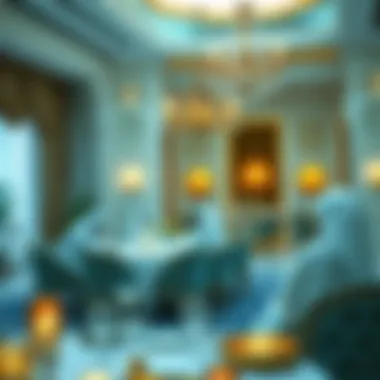

The concept of الفوالة has woven itself intricately into the fabric of urban development within the UAE, especially in Dubai. This integration has not only reshaped city landscapes but has also influenced the lifestyles and aspirations of Emiratis and expatriates alike. Understanding this relationship is crucial as it sheds light on the broader implications of wealth and cultural identity in a rapidly developing urban environment.
Architectural Innovations
The architectural innovations in urban development reflect an ambition to encapsulate the essence of الفوالة within physical structures. Skyscrapers like the Burj Khalifa and the opulent villas in Emirates Hills exemplify how design goes beyond aesthetics to embody cultural values.
- Cultural Representation: Each building tells a story, incorporating elements that resonate with Emirati heritage. The use of traditional motifs and modern technology creates a visual dialogue between past and present.
- Sustainable Practices: Architects today face the challenge of marrying luxury with sustainability. Many projects now focus on green building practices, with solar panels and water-efficient systems becoming standard in new developments.
- Community Spaces: Innovations are not limited to individual buildings. Public spaces designed for gatherings reflect the communal aspects of الفوالة. Parks, plazas, and waterfront promenades encourage social interaction and embody the spirit of hospitality which is pivotal in Emirati culture.
Community Building Initiatives
Moreover, الفوالة has paved the way for community-building initiatives that are essential for fostering social cohesion in urban environments. As neighborhoods evolve, developers find ways to enhance community engagement.
- Cultural Events: Regular festivals and markets celebrate local crafts, food, and traditions that reinforce the Emirati identity in the urban environment. These gatherings not only attract residents but also draw tourists, thus enhancing economic activity.
- Social Infrastructure: Investments are being made in social infrastructure, such as community centers and educational institutions that underline the importance of learning and culture.
- Public Art Projects: Street art and installations often reflect both contemporary and traditional themes associated with الفوالة, making art an accessible and everyday part of city life.
- Networking Opportunities: Special focus on creating platforms for networking among entrepreneurs and investors help to cultivate a thriving business community rooted in the principles of الفوالة.
The integration of الفوالة in urban development showcases not only wealth but also a commitment to creating spaces that honor cultural heritage while embracing modernity.
This complex relationship not only emphasizes aesthetic and economic values but also highlights the importance of shared experiences, thereby enriching the urban narrative of the UAE.
Social Dynamics among Emiratis
In the context of الفوالة, social dynamics among Emiratis play a substantial role in shaping interpersonal relationships and enforcing cultural norms. Social interactions are deeply woven into the fabric of Emirati identity and are often characterized by strong familial ties and traditions that date back generations. Wealth, especially in the form of الفوالة, can greatly influence these dynamics, providing both opportunities and challenges for individuals engaging in social networks.
Relationships and Networking
The importance of relationships in Emirati society cannot be overstated. In a culture where connections can greatly influence one’s social status and business opportunities, building and maintaining networks becomes critical. In this vein, الفوالة serves as more than just a measure of wealth; it becomes a currency in social exchanges.
Investors and property managers often rely on established ties to navigate the complex landscape of the UAE real estate market. For instance, attending social gatherings, whether formal or informal, allows individuals to forge connections with influential figures in the community. These interactions often lead to further collaboration in ventures, from real estate development to business inquiries.
"In Emirati culture, knowing the right person can mean the difference between success and failure."
Making introductions within these networks is an art; it’s common for Emiratis to leverage personal relationships for professional gain. The ability to network effectively can not only enhance one’s status but also increase visibility within lucrative circles. However, such practices can sometimes push boundaries, raising concerns about transparency in dealings.
Influence of الفوالة on Social Status
The concept of الفوالة intricately ties into societal perceptions of status among Emiratis. Wealth is often displayed in various forms, from extravagant gatherings to luxury purchases, which serve as indicators of one's social standing. Such displays can affect an individual's reputation, with higher wealth levels often correlating with elevated social prestige.
In many communities, there exists a dichotomy; those who embody الفوالة can experience both admiration and envy from their peers. This duality highlights the fact that while monetary wealth can undeniably elevate one’s status, it may also attract scrutiny and pressures to maintain appearances.
Moreover, social status constructed around الفوالة brings about expectations. For instance, engaging in philanthropy or community support is seen as both a duty and a privilege among wealthier Emiratis. Such undertakings not only contribute to personal branding but also reflect a commitment to enhancing society as a whole.
As the social landscape evolves, the impact of الفوالة continues to resonate through the intertwining of wealth with social interactions. Understanding this relationship offers valuable insight for investors, homebuyers, and property managers. Being aware of these nuances enables them to navigate the market with greater efficacy and cultural awareness.
The intertwining of wealth and social dynamics among Emiratis reveals much about the society at large, forming a crucial part of the dialogue surrounding الفوالة. As this topic develops, the balance between tradition and modernity will continue to shape the future of social relationships in the UAE.
Tourism and الفوالة: A Symbiotic Relationship
The intertwining of tourism and الفوالة اماراتية underscores a critical nexus in the economic and cultural fabric of the UAE. This relationship not only emphasizes wealth but also shapes the identity and appeal of the Emirati lifestyle. Tourists come not just to see the sights but to experience a level of luxury and hospitality that defines الفوالة. The hospitality sector thrives on the unique offerings that stem from this cultural wealth, catering to an international clientele eager for exclusivity.
Additionally, الفوالة contributes to the image of the UAE as a premier destination for affluent tourists, thereby supporting local economies and creating job opportunities across various sectors. The convergence of these two forces enhances the richness of the Emirati experience, making the UAE a go-to spot for those with the means to indulge.
Attracting International Interests
The allure of الفوالة extends far beyond the borders of the UAE. It's a beacon for international interests looking to invest, party, and experience high-end luxury.
- Diverse Offerings: Tour operators and luxury brands converge here to offer experiences that mimic the local wealth. From bespoke tours in vibrant souks to high-end yacht charters along the Arabian Gulf, there's something for every taste.
- Cultural Festivals: Events such as the Abu Dhabi Film Festival and Dubai Shopping Festival capture global attention, showcasing Emirati culture against a backdrop of opulence. These events not only entertain but also invite wealthy visitors to partake in the local tradition of الفوالة, fostering a deeper connection with the culture.
- Real Estate Opportunities: As international buyers flock to luxurious properties, investors recognize the potential of the Emirati lifestyle in the real estate market. This directly ties back to الفوالة, as the demand for luxurious residences increases, which subsequently drives prices and showcases the lifestyle further.
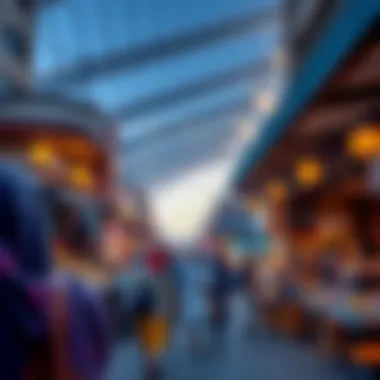

"Tourists come to experience not just the luxury, but how wealth is intertwined with the culture of الفوالة."
Luxury Experiences and Offerings
When it comes to luxury, الفوالة offers an array of experiences that leave an indelible mark on visitors.
- Gastronomic Delights: High-end restaurants led by world-renowned chefs highlight Emirati cuisine, bringing traditional flavors to sophisticated palettes. This culinary fusion appeals to tourists who seek both authenticity and innovation.
- Spa and Wellness Retreats: The emphasis on relaxation is palpable in places like the Burj Al Arab, where indulgent spa services are paired with stunning views. Travelers are drawn to these sanctuaries not solely for the treatments but also for the experience of Emirati generosity that comes with it.
- Exclusive Retail: Luxurious shopping experiences abound in landmarks like The Dubai Mall, where brands compete to provide unique products tailored to the affluent customer. The act of shopping itself becomes a cultural journey, deeply rooted in the Emirati tradition of hospitality and abundance.
In summary, the bond between tourism and الفوالة is not merely financial; it’s a cultural exchange that enriches both visitors and locals. Through luxury experiences and a collaborative spirit, the UAE continues to thrive as a premier destination, attracting global interests in its wealth and heritage.
Challenges and Criticisms
It’s essential to scrutinize the challenges and criticisms surrounding الفوالة الاماراتية, especially when looking at its impact on modern Emirati society. As the UAE embraces its wealth and prosperity, it is imperative to strike a balance between honoring traditions and facing current realities.
The concept of consumerism within الفوالة has drawn a significant amount of attention. On one hand, this notion celebrates the luxury and abundant lifestyle that many Emiratis lead, fueled by the nation’s oil wealth. However, this presents a clash with the deep-rooted values of tradition and modesty that characterize Emirati culture. As luxury brands adorn Dubai's skyline, traditional values risk being overshadowed. Many worry that excessive focus on material wealth may dilute the rich cultural heritage that has been passed down through generations. The juxtaposition of consumer culture and tradition raises important discussions and leads to the question: Can Emiratis reconcile their heritage with modern consumerism?
Consumerism vs. Tradition
In the realm of الفوالة, consumerism is often criticized for overshadowing traditional Emirati customs. For example, while extravagant events featuring high-end fashion and luxury goods have become commonplace, many older Emiratis recall simpler times where community gatherings and cultural celebrations were more meaningful.
- Luxury Events: High-profile weddings and galas act as platforms for showcasing wealth, but they often overlook cultural significance.
- Cultural Festivals: These serve as a reminder of UAE’s rich history and traditions but may struggle to compete with the allure of shiny, new consumer products.
This spotlight on consumerism tends to shift the focus away from community values and deeper connections, which are fundamental to Emirati identity. The challenge here is finding a way for contemporary Emiratis to embrace their luxury lifestyle while simultaneously respecting and preserving their cultural heritage.
Environmental Considerations
With the rise of luxury lifestyles, environmental concerns have come to the fore. As high spending reinforces consumer habits, it often leads to increased resource consumption without sufficient regard for sustainability. The construction boom in cities like Dubai exemplifies how rapid development can adversely affect the environment.
- Urban Expansion: The continuous expansion of urban areas requires significant natural resources, raising issues related to water usage and land depletion.
- Waste Management: High consumption patterns yield immense waste, putting pressure on local waste disposal systems. The flashy packaging and short-lived products further exacerbate the problem.
Considering the repercussions of opulent lifestyles on the environment has sparked conversations among Emiratis about sustainability and responsible consumption. Many are beginning to advocate for eco-friendly practices, aiming to balance the economic benefits of wealth generated by الفوالة with the necessity of preserving their environment for future generations.
"Wealth should not come at the price of our home; sustainability is essential for our future." This sentiment echoes among those who recognize the importance of protecting the beautiful landscapes that define the Emirati identity.
Addressing these challenges, Emiratis and their leaders must acknowledge the pitfalls of consumer culture while working to incorporate sustainability into their luxurious lifestyles.
In summary, understanding the challenges and criticisms of الفوالة الاماراتية invites a broader dialogue on its implications for societal values, tradition, and the environment. This discourse is crucial for shaping the future of Emirati identity amidst economic prosperity.
Future Perspectives on الفوالة
The concept of الفوالة holds a unique position in the fabric of Emirati society, and its future implications warrant careful consideration. Much like the shifting sands of the desert, الفوالة evolves, shaped by changing economic landscapes, cultural shifts, and global influences. Understanding these future perspectives is crucial for various stakeholders, including investors, homebuyers, and property managers, who wish to navigate the complexities of wealth in the UAE.
One of the primary elements that will define the future of الفوالة is its alignment with sustainability trends. As the global community becomes increasingly aware of environmental issues, the Emirati approach to wealth and luxury is also shifting towards more sustainable practices. This transition is not just about maintaining a lavish lifestyle but also about ensuring that future generations inherit a world that is both prosperous and ecologically sound.
Sustainability Trends
The rise of sustainability in الفوالة signifies an important transformation. Sustainable building practices and eco-friendly materials are gaining traction in the real estate market. In Dubai, developers are beginning to integrate green spaces and energy-efficient technologies into their projects. By merging luxury with sustainability, الفوالة can continue to allure affluent buyers who are keen on preserving the environment while enjoying their wealth.
- Increasing emphasis on eco-conscious living among the wealthy.
- Development of green luxury properties, such as Al Barari, known for its lush surroundings.
- Initiatives aimed at reducing the ecological footprint of high-end developments.
Furthermore, community-driven sustainability projects reflect a collective commitment to preserving the cultural and natural identity of the UAE. The incorporation of such elements into الفوالة enhances its relevance in a world where consumers are becoming more selective about their consumption habits.
Evolution of Emirati Identity
The future of الفوالة is also entwined with the evolution of Emirati identity. As UAE becomes a melting pot of cultures, the perception of wealth and societal status is continuously reshaped. Emiratis are recalibrating what it means to be wealthy, moving away from mere materialism towards a more holistic approach that values experiences, cultural heritage, and social responsibility.
The trend towards redefining wealth poses several interesting points for keen observers:
- There is a growing appreciation for local artisans and traditional crafts, highlighting a desire to maintain cultural roots.
- Individuals are focusing more on personal brand and public impact rather than just accumulation of assets.
- The increase in charitable contributions and social enterprises among the wealthy creates a more interconnected community.
In a rapidly changing landscape, the essence of الفوالة may not solely rely on material wealth but increasingly encompass values that resonate with both tradition and modernity.
As these dynamics unfold, stakeholders must remain vigilant to adapt to the shifting paradigms. Engaging with the community and fostering organic relationships will not only enhance social standing but could also lead to innovative opportunities that align with the aspirations of the new generation of Emiratis.


